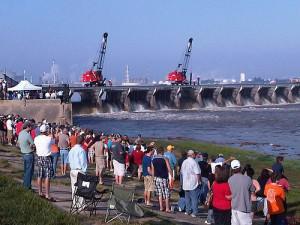 One of the most important components of sustainable development is the ability to plan for the long term. This goes hand and hand with living within nature’s limits. The root idea behind sustainability is the notion of maintaining a process indefinitely. However, with quarterly earnings driving much of the progress today, long term thinking and planning is not as highly valued.
One of the most important components of sustainable development is the ability to plan for the long term. This goes hand and hand with living within nature’s limits. The root idea behind sustainability is the notion of maintaining a process indefinitely. However, with quarterly earnings driving much of the progress today, long term thinking and planning is not as highly valued.
Recent floods and attempts to “control” them up and down the Mississippi River provide a prime example of the short term thinking that has come to dominate collective decision making. John McPhee’s The Control of Nature looks at three examples of how mankind has attempted to subdue nature for its benefit. Written more than 20 years ago, McPhee’s book starts with the Mississippi River, which has been mangled by the Army Corps of Engineers. Under the guise of economic development for the New Orleans area, the Corps has straightened and rerouted the mighty Mississippi. Unfortunately, the current path is not the one of least resistance. As McPhee details, the river continually tries to find the most expedient path. Apparently no one told it that man has figured this out. The issue comes down to one of control, hence the title of the book. Instead of working against nature, which is the unsustainable path, it is imperative to work with it. Biomimicry is a great example of learning from nature as opposed to changing it for human enjoyment.
Floods are a natural phenomenon, a necessary one. In order for nutrients to be redeposited on farm lands in many places, floods must occur. However, in this country growth has taken place in the oddest of places. After the great floods in Missouri during the early 1990s, vast tracts of land were inundated. Now, in those same locales, there are vast mega-marts. Suburban sprawl has led to construction on land such as floodplains and drained wetlands. These spaces provide ecosystem services that have not been adequately valued. This is another major component of sustainable development, proper valuation of undeveloped lands. Until we can assess their importance in terms of fiscal benefits, protecting them will be increasingly difficult.
Here’s to hoping that the enormous financial impact of floods and storms can finally help to evaluate the fiscal value of these “marginalized” lands.
[Image source]

